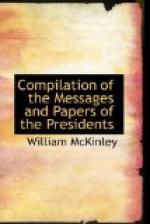No practical relief was accorded to the destitute. The overburdened towns, already suffering from the general dearth, could give no aid. So-called “zones of cultivation” established within the immediate areas of effective military control about the cities and fortified camps proved illusory as a remedy for the suffering. The unfortunates, being for the most part women and children, with aged and helpless men, enfeebled by disease and hunger, could not have tilled the soil without tools, seed, or shelter for their own support or for the supply of the cities. Reconcentration, adopted avowedly as a war measure in order to cut off the resources of the insurgents, worked its predestined result. As I said in my message of last December, it was not civilized warfare; it was extermination. The only peace it could beget was that of the wilderness and the grave.
Meanwhile the military situation in the island had undergone a noticeable change. The extraordinary activity that characterized the second year of the war, when the insurgents invaded even the thitherto unharmed fields of Pinar del Rio and carried havoc and destruction up to the walls of the city of Havana itself, had relapsed into a dogged struggle in the central and eastern provinces. The Spanish arms regained a measure of control in Pinar del Rio and parts of Havana, but, under the existing conditions of the rural country, without immediate improvement of their productive situation. Even thus partially restricted, the revolutionists held their own, and their conquest and submission, put forward by Spain as the essential and sole basis of peace, seemed as far distant as at the outset.
In this state of affairs my Administration found itself confronted with the grave problem of its duty. My message of last December[4] reviewed the situation and narrated the steps taken with a view to relieving its acuteness and opening the way to some form of honorable settlement. The assassination of the prime minister, Canovas, led to a change of government in Spain. The former administration, pledged to subjugation without concession, gave place to that of a more liberal party, committed long in advance to a policy of reform involving the wider principle of home rule for Cuba and Puerto Rico.
The overtures of this Government made through its new envoy, General Woodford, and looking to an immediate and effective amelioration of the condition of the island, although not accepted to the extent of admitted mediation in any shape, were met by assurances that home rule in an advanced phase would be forthwith offered to Cuba, without waiting for the war to end, and that more humane methods should thenceforth prevail in the conduct of hostilities. Coincidentally with these declarations the new government of Spain continued and completed the policy, already begun by its predecessor, of testifying friendly regard for this nation by releasing American citizens held under one charge or another connected with the insurrection, so that by the end of November not a single person entitled in any way to our national protection remained in a Spanish prison.




